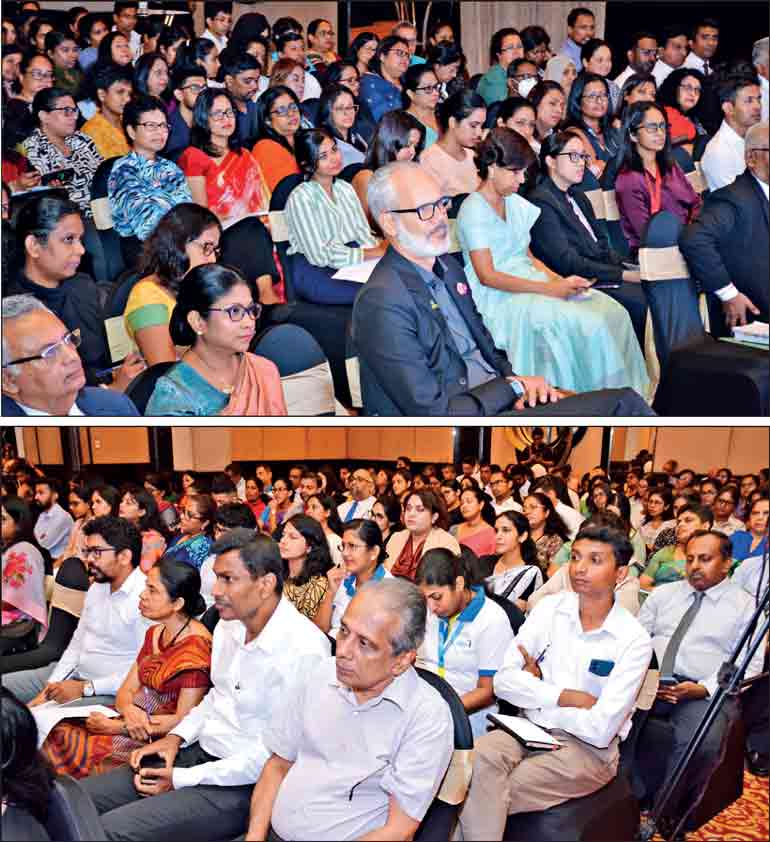Sunday Feb 22, 2026
Sunday Feb 22, 2026
Monday, 13 October 2025 00:00 - - {{hitsCtrl.values.hits}}


By Divya Thotawatte
Targeting hidden wealth, the new amendments to the Companies Act demands full disclosure of beneficial ownership, but secrecy and complex offshore structures will make enforcement difficult, said a panel of industry experts and stakeholders recently.
This discussion took place at a seminar on the Companies (Amendment) Act No 12 of 2025. Organised by Corporate Management Consultants, the event brought together regulators, lawyers, and compliance officers to unpack the new law.
NSB Chairman Dr. Harsha Cabral was the keynote speaker, joined by SEC Former Chairman Dr. DC Jayasuriya and Financial Intelligence Unit Director Subhani Keerthiratne. A panel discussion also featured Registrar General of Companies Aravindi De Silva, CSE Former Chief Regulatory Officer Renuke Wijewardena, and Registrar of Companies Attorney-at-Law Shyama Harshani.
The new amendment was designed to end anonymous ownership and align Sri Lanka with global anti-money laundering standards. The law requires companies to register their beneficial owners, while banning bearer shares and imposing strict disclosure, reporting, and compliance obligations, explained Jayasuriya, while Keerthiratne highlighted the importance of these measures. Thereby, non-compliance carries fines and criminal liability, reflecting a push for greater transparency ahead of the FATF evaluation.
However, enforcement would be challenging due to hidden family wealth often known to only one person, Cabral said during his keynote address. “Beneficial ownership is something we always talk about… who the ultimate beneficiary is. Sometimes in families, when maybe only the husband knows of your family wealth... you can’t tell the wife or the children.”
The law requires companies to maintain detailed registers of beneficial ownership for ten years, even after liquidation, and notify the Registrar of any changes within 14 days. Ignorance or feigning ignorance is not an acceptable excuse for any director or secretary, Cabral added.
However, tracing ownership through multiple companies remained a challenge, he said. “If you say that you have to get, that company is in Hong Kong, then to see who are the owners of that company. Well, another company in the British Virgin Islands and another gentleman in Canada. So how much of it can be traceable? How much of it can be achieved is going to be a tough one.”
Companies are also required to provide details of beneficial owners to the public upon request, ensuring accountability, Cabral added.
Penalties for non-compliance are substantial and target not only directors and secretaries but also officers and shareholders. Cabral advised that large companies should appoint a dedicated compliance officer to ensure that all obligations are properly signed off.
Expanding on enforcement challenges, Wijewardena discussed the role of the Central Depositary System (CDS): “In a private environment, before the issuance of a share or transfer of share, it’s all done manually, but in a listed environment that is not so because you really don’t know whose life you share. Monday morning somebody will come and take over the company at 9:35, so you get to rely on information from the CDS.”
He said that while the CDS can facilitate information flow, the primary responsibility was with the company and its shareholders, and the companies would not be able to escape liability by blaming the CDS.
Wijewardena also warned about challenges with corporate and foreign investors. He explained that where it was easy to assume beneficial ownership with individuals, doing so with regards to corporations and funds was more complex. Foreign funds were extremely complex because the beneficiaries themselves were not aware of where the funds were invested.
“Their funds are managed through a very complex structure. Global custodians, sub custodians, that’s the way that they have been operating. And we need to balance the compliance regulation with the economic factors also.”
Harshani said the Registrar’s Department was in the process of preparing the necessary regulations and formats, with technical assistance from the World Bank. She added that the system would also be digitalised, allowing filings to be done online. She also explained that electronic signatures would be recognised and accepted to simplify procedures for companies.
Pix by Upul Abayasekara